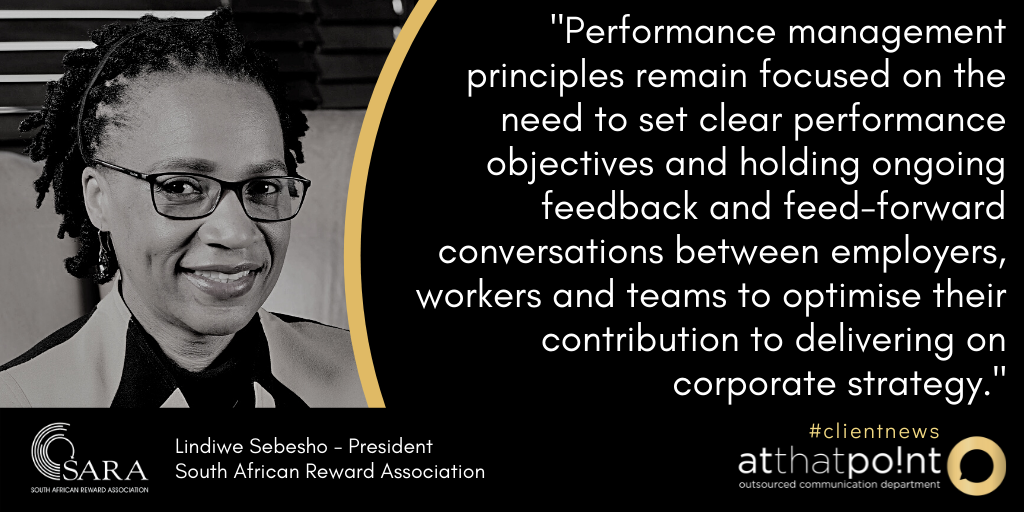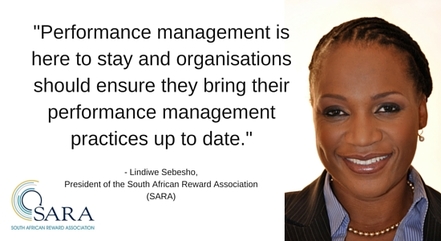 The launch of ChatGPT late in 2022, and the tremendous interest it provoked, inaugurated what one will one day see as the Age of Artificial Intelligence (AI). AI will make it easier to generate outputs in virtually every industry, creating a challenge for reward professionals: how does one measure an individual’s performance when one of his or her outputs can be generated by an algorithm? “AI is here to stay, and we can expect it to get significantly better. Reward professionals should see it as a great opportunity to refine their thinking about what constitutes great performance, and thus how to reward it,” argues Dr Mark Bussin, Master Reward Specialist and Executive Committee Member of the South African Reward Association (SARA). “Specifically, AI prompts us to look at what humans do best and use that insight to determine how we measure and reward our people.” Dr Bussin offers the following tips to help reward professionals, and HR more generally, to use the AI revolution to the advantage of their organisations: Focus on creativity, quality and innovation. AI is going to be a great tool for automating routine tasks, but when it comes to creative problem-solving or generating innovative ideas, it is a non-starter. Finding ways to reward individuals or teams for creativity rather than output would be beneficial to both the employees and the organisation. Similarly, reward professionals should look for metrics that measure quality rather than quantity. For example, customer satisfaction or product ratings could be used to assess the performance of an individual or team. Emphasise collaboration. Humans have leveraged the power of collaboration to overcome seemingly insurmountable challenges over thousands of years. Encouraging individuals or teams to work together and rewarding them for doing so will play to humanity’s strengths and will generate excellent results. Provide a sense of purpose. Humans are motivated to perform better when they feel their work is making a positive impact—AI is just a machine. Global research shows that purpose-driven companies realise huge benefits. Making sure the organisation has a clear vision and purpose can motivate employees to do their best, and ultimately drive the company’s performance in achieving its strategic goals. Develop policy guidelines relating to the use of AI. Everybody in the organisation needs to know how AI should—and should not—be used. Each industry will have its own set of ethical issues, and employees will need charts to navigate this tricky terrain. Provide professional development opportunities. It’s long been recognised that professional development is a key lever when it comes to attracting and retaining top talent—and driving high performance. Alongside providing policies to guide employees, organisations must provide employees with ongoing training in this rapidly changing technology and what it means for them. They will use it better and, as an added bonus, they will be more likely to remain with, or want to join, the organisation. Use AI to speed up the drafting of reports and policies. Finally, HR and reward professionals themselves should find ways to use AI to make themselves more efficient. Freeing up more time to be devoted to adding value will also protect their own positions. “The onward march of AI is in fact an opportunity for us all, and reward professionals in particular, to concentrate on the things that humans do best and focus on supporting them—leaving the drudge work to the machines,” Dr Bussin concludes. ENDS MEDIA CONTACT: Rosa-Mari Le Roux, [email protected], 060 995 6277, www.atthatpoint.co.za For more information on SARA please visit: Website: www.sara.co.za Twitter: @SA_reward LinkedIn: South African Reward Association Facebook: SARA – South African Reward Association
1 Comment
Apart from the where, when and how of employee performance management, not much has changed since the emergence of COVID-19. This is according to Lindiwe Sebesho, Master Reward Specialist and Executive Committee Member at the South African Reward Association (SARA).
"This is because the key principles in performance management remain relevant in measuring and improving employee contribution to business performance or growth," she says. Performance philosophy Many organisations have become a mix of full time on-premises, fixed-hour staff and work-from-home (WFH) employees with flexible hours. So whilst how their performance is set, monitored and evaluated may be more complex, the need to manage performance remains key for business success. Leveraging technology, most employers are optimising various digital platforms that enable real-time, simple-to-use processes to ease the management of performance across the expanded enterprise. However, performance management principles remain focused on the need to set clear performance objectives and on holding ongoing feedback and feed-forward conversations between employers, workers and teams to optimise their contribution to delivering on corporate strategy. Therefore this process still aims to foster a continuous improvement ethic that focused individuals and teams on activities that drive business growth. Its outcomes are largely still ratings based and are used to inform fair, business-aligned skills development, reward and talent decisions such as succession planning. Key principles Organisations still need to clearly communicate their purpose, growth goals, ambition and strategy within a well-defined business context. Next, they must align employee efforts through personal, team, financial and non-financial objectives and key results (OKRs) that capture essential outcomes. As staff execute their duties, regular check-in conversations and real-time feedback enable development and continuous improvement of performance. Further, regular feedback and ratings should be administered, leading to formal annual evaluations that use an established rating scale linked to desired standards of contribution. These rating outcomes are then used as input for making reward and other talent-related decisions. "Whatever the circumstances, business must not become distracted from this proven approach to performance management even where different working arrangements have been adopted," says Sebesho. Underperformance With the country's economic downturn, organisations are eager to maximise resource output wherever possible. Accordingly there is a more concerted effort towards the proactive management of underperformance among staff. "While managers may have let underperformance slide in the past, they are now more focused On ensuring that every worker contributes to growth consistently," says Sebesho. As part of managing under-performance, it is key to understand the factors that negatively impact employee performance. The first is a lack of skills that could result from an ineffective education system and/or limited investment by employers in training and development. Assigning employees to roles that do not fit their competencies can also hamper optimal performance. Organisations that invest in skilling up workers and ensure employees are equal to their responsibilities can overcome this hurdle. The second is low employee morale and engagement, which can be caused by anything from the threat of retrenchments to rewards that do not align with worker values. The best solution is for management to establish a culture of open communication and engage with staff to determine the causes of poor morale. A show of concern alone can help reignite employee interest, although employers must follow through with solutions to maintain trust. Even workers with good morale may suffer from the third factor, a lack of motivation. This can be caused by societal conditions, such as social unrest or political instability, leading to personal problems, like poor mental or physical health. Employers can offset these obstacles with a comprehensive employee value proposition, additional mental and physical wellness support, and positive reinforcement through recognition of desired behaviours. Finally, a lack of resources may prevent employees from producing their best work. Low national economic growth, employer budget cuts or inadequate infrastructure, like transport and telecoms, can rob them of opportunities to work effectively. Employers should consider budgeting for critical resources that enable better productivity, and provide alternative working arrangements, like flexible hours or work-from-home solutions where the nature of jobs allow for such. They also need to provide technical and digital skills support where required. Enhanced performance In summary, WFH and hybrid models necessitated by the pandemic have created greater flexibility in the where, how and when of employee performance but have not necessarily changed the core principles of performance management which remain largely the same and employers must apply them consistently for the best results. Employers should therefore leverage technology to develop simple, real-time processes that enable performance management across expanded enterprise boundaries and maximise their people resources by minimising underperformance. "By acknowledging these trends, employers can maximise their workforce's performance and pursue their full growth potential despite the various operational challenges they face" says Sebesho. ENDS MEDIA CONTACT: Rosa-Mari Le Roux, [email protected], 060 995 6277, www.atthatpoint.co.za For more information on SARA please visit: Website: www.sara.co.za Twitter: @SA_reward LinkedIn: South African Reward Association Facebook: SARA – South African Reward Association  Interview with Lindiwe Sebesho, past president and current EXCO member of the South African Reward Association (SARA), a professional association that develops and advances ethical total reward practices in South Africa. Q: Why are year end performance appraisals still a popular tool? A: Although many companies have moved away from traditional once-a-year appraisals in favour of more regular performance engagements throughout the year, the year-end performance appraisal is still a key focus in many organisations as it summarises the full year’s performance and guides various talent decisions. There is an appreciation of the need to focus on the quality of appraisal conversations to improve the motivation impact thereof. One way in which the quality can be improved is through forward-looking conversations where past performance is referenced mainly for the purpose of acknowledging great outcomes and guiding actions to sustain or improve performance in the future. This enables both managers and employees to focus on how they can optimally contribute towards business success and achieve career growth. Q: Why are performance review conversations a source of worry for managers? A: Some managers do not set clear expectations or regularly give honest and constructive feedback. This leads to difficulty in addressing common performance challenges during year end appraisals when the stakes are high with regards to the post appraisal talent decisions e.g. reward. This becomes the source of stress as they don’t feel confident that they can deal with the robust interactions that are part of the performance management process. Q: Should performance appraisals be left to HR professionals, or can line managers be trained to conduct performance conversations with confidence? A: Anyone can be guided or trained to manage performance discussions with confidence. SARA is offering a free webinar on 24 October, 9:30-11:00, for anyone that wants to prepare themselves for great performance appraisals. Register in advance for this webinar at https://zoom.us/webinar/register/89e5e8e648899e2c4ac87b605f06faf5 ENDS MEDIA CONTACT: Juanita Vorster, 079 523 8374, [email protected], www.atthatpoint.co.za For more information on SARA please visit: Website: www.sara.co.za Twitter: @SA_reward LinkedIn: South African Reward Association Facebook: SARA – South African Reward Association  Despite the changes being made to many organisation’s performance management processes, setting clear performance objectives is vital. It ensures that employees focus on work that helps them contribute optimally to both team and business success whilst growing their careers. “If done right, goal setting is still considered key in enabling employees to start any performance period or role with an understanding of their role priorities and what success looks like,” says Lindiwe Sebesho, Executive Committee Member, South African Reward Association (SARA). “It can also direct development efforts as employees can use this as reference for refining their capabilities for the short and long term growth. Most importantly, setting effective objectives reduces the stress associated with performance reviews for those organisations that still hold these formally.” Whilst performance objectives used to be set annually at the beginning of a performance period, more organisations now encourage shorter objective setting cycles e.g. quarterly, as this helps them adjust their focus in line with changes in their environment. “It is important that employees optimise the objective setting processes in their companies to align their career goals with those of the organisation,” says Sebesho. “As goal setting discussions usually happen in teams and/or directly with an employee’s line manager, employees can use these goals to understand key business priorities and the contributions they can make. Not only should this ensure that their performance is in line with what the company expects from them, but it also enables them to work proactively towards a common result which benefits all.” Clear performance objectives are imperative There are various ways in which organisations guide the development of objectives to ensure that they are output focused and drive valued results. The most common of these is the CSMART principle: Challenging, Specific, Measurable, Attainable, Realistic and Timely. Using this guide, employees can ensure that their objectives are clearly defined and can be used to indicate intent and substantiate achievements. Sebesho says this is particularly important as many organisations use performance outputs to determine different reward elements. “Salaries, bonuses and incentives are usually tied to the level of achievement against stretched performance objectives and targets. So, to set yourself up for success, not only for reward purposes, but in terms of career progression, it is important to be clear about the contribution you have to make and the standards against which your performance will be assessed. Setting effective objectives is therefore a key part of owning your success as an employee.” ENDS MEDIA CONTACT: Cathlen Fourie, 082 222 9198, [email protected], www.atthatpoint.co.za For more information on SARA please visit: Website: www.sara.co.za Twitter: @SA_reward LinkedIn: South African Reward Association Facebook: SARA – South African Reward Association Top organisations are improving employee performance practices |
Archives
March 2023
Welcome to the South African Reward Association newsroom.
Categories
All
|



 RSS Feed
RSS Feed